Why did Rainsford kill Zaroff? The narrative unfolds in a compelling and distinctive manner, drawing readers into a story that promises to be both engaging and uniquely memorable. The tale explores the complex interplay between hunting, morality, and the nature of humanity, culminating in a thrilling climax that leaves a lasting impression.
Rainsford, an experienced hunter, finds himself stranded on a remote island inhabited by the enigmatic Count Zaroff. Zaroff, a seasoned hunter himself, has a twisted philosophy that challenges Rainsford’s beliefs about the sanctity of life and the ethics of hunting.
As Rainsford becomes the hunted in Zaroff’s deadly game, he is forced to confront his own nature and the boundaries of his morality.
Introduction
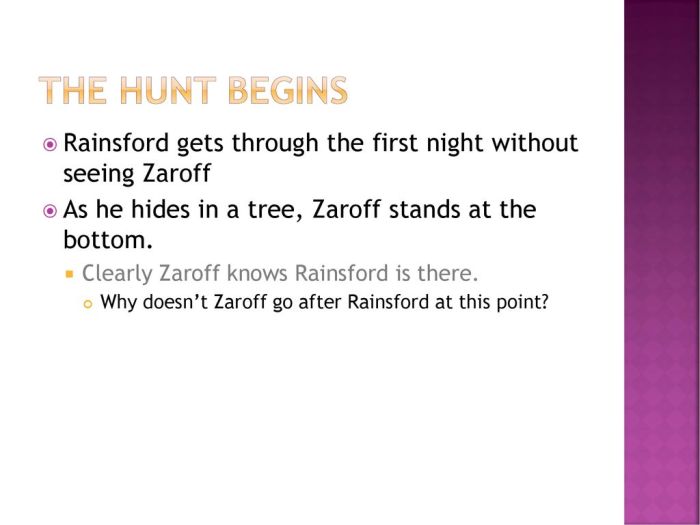
In Richard Connell’s short story “The Most Dangerous Game,” Rainsford, a big-game hunter, finds himself stranded on a mysterious island inhabited by the eccentric Russian aristocrat, General Zaroff. Zaroff reveals that he has grown tired of hunting animals and now considers humans to be the ultimate prey.
Rainsford is appalled by Zaroff’s twisted game and refuses to participate. However, he soon realizes that he has no choice but to fight for his own survival. The story follows Rainsford’s desperate struggle to outwit and defeat Zaroff, ultimately leading to a climactic confrontation that forces Rainsford to confront his own moral dilemmas.
Rainsford’s Motives: Why Did Rainsford Kill Zaroff
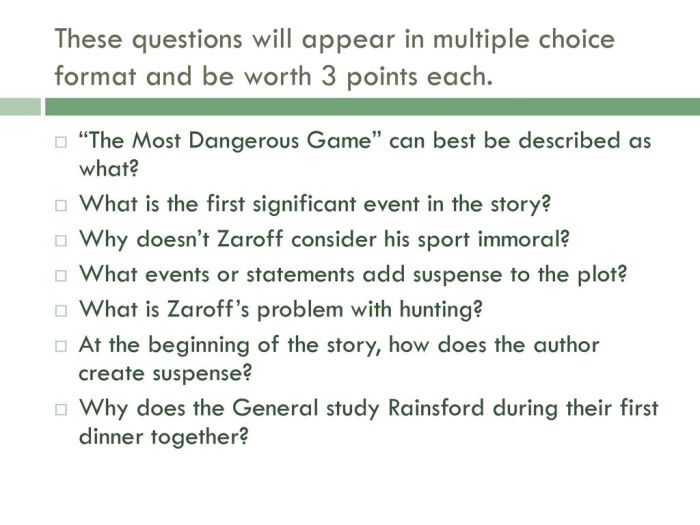
Rainsford, initially an experienced and skilled hunter, held a traditional view of hunting as a sport with rules and ethics. He believed in fair chase and the thrill of the pursuit. However, his encounter with Zaroff on Ship-Trap Island challenges these beliefs.Zaroff’s
actions and philosophy force Rainsford to confront the dark side of hunting. Zaroff sees humans as the ultimate prey, and his twisted game of hunting men subverts the traditional norms of the sport. This challenges Rainsford’s assumptions about the morality of hunting and forces him to question his own motives.
Rainsford’s decision to kill Zaroff stemmed from the latter’s twisted hunting game that dehumanized human beings. Zaroff’s actions reminded Rainsford of the chilling poem The Secret by Denise Levertov, where the speaker uncovers the horrors hidden beneath a seemingly ordinary facade.
Similarly, Rainsford realized that Zaroff’s facade of civilization masked a dark and monstrous nature, ultimately leading him to confront and eliminate the threat Zaroff posed.
Emotional and Psychological Factors
Rainsford’s emotional and psychological state also plays a significant role in his decision to kill Zaroff. Zaroff’s relentless pursuit and the constant threat to his life drive Rainsford to a point of desperation. He experiences fear, anger, and a growing sense of injustice.
These emotions fuel his determination to survive and ultimately lead him to take action against Zaroff.
Zaroff’s Character and Actions
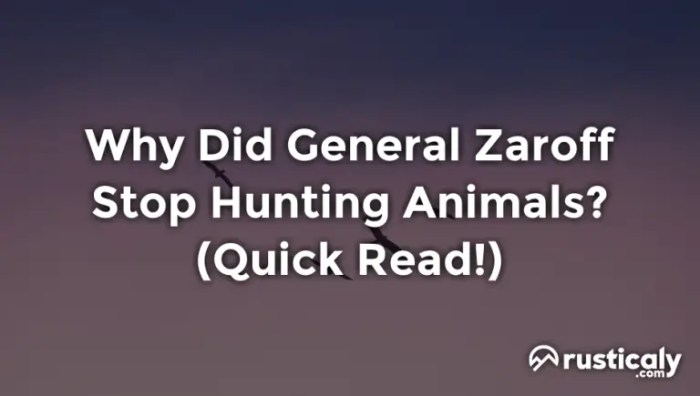
Zaroff is a complex and enigmatic character. He is a Russian aristocrat who has become bored with the traditional forms of hunting. He has created a private game preserve on Ship-Trap Island, where he hunts human beings for sport.Zaroff’s character is defined by his arrogance and his belief in the superiority of the upper classes.
He sees himself as a master of life and death, and he believes that he has the right to kill anyone he pleases. He is also a sadist who enjoys the suffering of his victims.Zaroff’s views on hunting and his treatment of others contribute to Rainsford’s decision to kill him.
Rainsford is a civilized man who believes that hunting should be fair and ethical. He is horrified by Zaroff’s treatment of his victims, and he believes that Zaroff must be stopped.The ethical implications of Zaroff’s actions are clear. He is a murderer who has no respect for human life.
His actions are a violation of the most basic moral principles. Rainsford’s response to Zaroff is justified because he is acting in self-defense and because he is trying to stop a madman from committing further atrocities.
The Impact of the Hunt
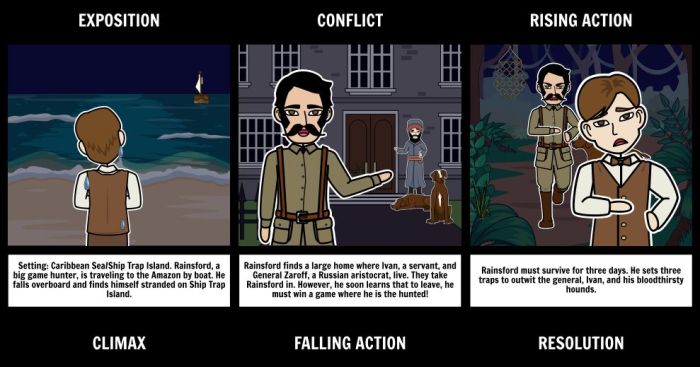
The hunt initiated by Zaroff on Ship-Trap Island subjects Rainsford to a series of arduous physical and psychological challenges that profoundly test his limits and compel him to confront the darker aspects of his own nature.
Physical Challenges
- Rainsford is forced to navigate treacherous terrain, enduring the unforgiving elements and relentless pursuit by Zaroff.
- He must rely on his physical endurance and survival instincts to outmaneuver Zaroff and stay alive.
Psychological Challenges
- The hunt exposes Rainsford’s inner fears and doubts, as he is constantly hunted and stalked by Zaroff.
- He is forced to question his own morality and the boundaries of civilized behavior as he witnesses Zaroff’s sadistic pleasure in hunting humans.
- The psychological toll of the hunt gradually wears down Rainsford, testing his resolve and forcing him to confront his own capacity for violence.
Turning Point
The hunt serves as a transformative turning point in Rainsford’s life. It challenges his previous beliefs about hunting and the nature of man. By facing the horrors of Zaroff’s twisted game, Rainsford is forced to confront the darkness within himself and ultimately redefine his own moral compass.
The Final Confrontation
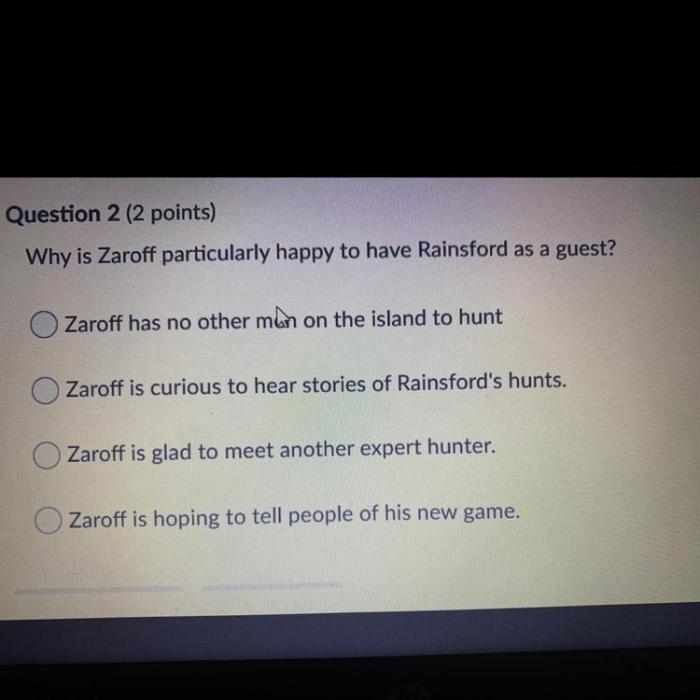
As the hunt reached its climax, Rainsford found himself cornered and desperate. Zaroff had pursued him relentlessly, his every move calculated to torment and exhaust his prey. With each passing hour, Rainsford’s resolve wavered, and the realization dawned upon him that he could not escape his relentless pursuer.Faced
with the inevitability of his demise, Rainsford resolved to take matters into his own hands. He devised a cunning plan, luring Zaroff into a treacherous bog, where the hunter’s arrogance and overconfidence became his undoing. In a desperate struggle for survival, Rainsford seized the opportunity to plunge his knife into Zaroff’s heart, ending the gruesome game once and for all.
Strategies and Tactics
The final confrontation between Rainsford and Zaroff was a masterclass in survival and deception. Rainsford, the hunted, used his wits and knowledge of the island’s terrain to outmaneuver his pursuer. He employed stealth and cunning, using the dense jungle vegetation to conceal his movements and ambush Zaroff at an opportune moment.Zaroff,
on the other hand, relied on his superior strength and hunting prowess. He relentlessly pursued Rainsford, using his tracker skills and intimate knowledge of the island to close in on his prey. However, his arrogance and overconfidence ultimately proved to be his downfall, as he underestimated Rainsford’s determination and resourcefulness.
Setting and Atmosphere, Why did rainsford kill zaroff
The setting of the final confrontation played a crucial role in shaping the tension and suspense of the climax. The dense jungle vegetation created a claustrophobic and oppressive atmosphere, amplifying the sense of danger and isolation. The eerie silence of the forest, broken only by the sounds of pursuing footsteps, heightened the anticipation and dread.As
the confrontation reached its peak, the setting transformed into a symbolic representation of the struggle between good and evil. The treacherous bog, with its murky depths and suffocating mud, became a metaphor for the moral decay and depravity that had consumed Zaroff.
Rainsford’s victory over his pursuer in this desolate and unforgiving environment symbolized the triumph of hope and human resilience over the forces of darkness and despair.
Aftermath and Significance
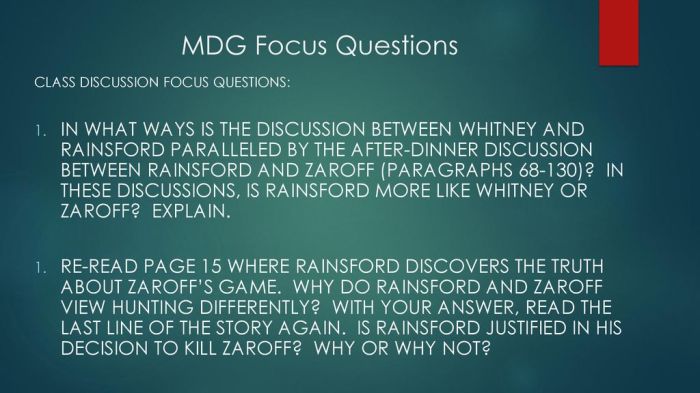
The aftermath of Rainsford’s actions is profound. Immediately, he is left with a deep sense of guilt and remorse over killing Zaroff. However, this guilt is accompanied by a newfound sense of self-reliance and courage. Rainsford realizes that he is capable of great strength and determination, even in the face of danger.
Long-term, Rainsford’s experience on the island shapes his character and worldview. He becomes more introspective and reflective, questioning the nature of humanity and the boundaries of civilization. The hunt with Zaroff forces Rainsford to confront his own capacity for violence and the dark side of human nature.
Justice, Morality, and the Nature of Humanity
The story raises important questions about justice, morality, and the nature of humanity. Rainsford’s actions can be seen as an act of self-defense, as he was being hunted by Zaroff. However, the story also raises questions about the ethics of killing, even in self-defense.
Is it ever justified to take a human life?
The story also explores the nature of humanity. Zaroff is a complex character, both cruel and civilized. He represents the dark side of human nature, capable of great cruelty and violence. Rainsford, on the other hand, represents the more civilized side of humanity, valuing life and compassion.
The conflict between these two characters highlights the duality of human nature.
Frequently Asked Questions
What is the significance of Rainsford’s transformation throughout the story?
Rainsford’s transformation from a confident hunter to a hunted man challenges his beliefs and forces him to confront the darker aspects of human nature. This journey ultimately leads him to question the ethics of hunting and the value of life.
How does Zaroff’s character contribute to Rainsford’s decision to kill him?
Zaroff’s twisted philosophy and treatment of others, particularly his callous disregard for human life, drive Rainsford to the realization that Zaroff must be stopped. Zaroff’s actions justify Rainsford’s response as an act of self-preservation and justice.
What are the broader implications of the story for themes such as justice and morality?
The story explores the complex interplay between justice and morality, raising questions about the limits of self-defense and the potential for redemption. It also examines the nature of good and evil, highlighting the darkness that can lurk within seemingly civilized individuals.
